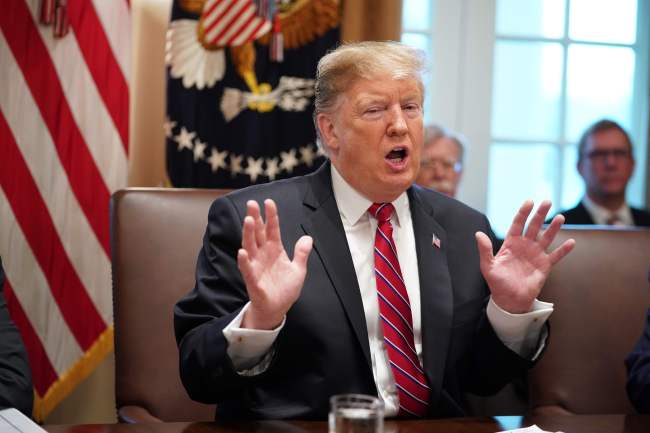South Korea’s presidential office said Wednesday that Seoul and Washington had not agreed to a possible sharp increase in Seoul’s share of the costs of stationing US Forces Korea here, in response to recent remarks by US President Donald Trump that the cost burden would keep growing.
Cheong Wa Dae spokesman Kim Eui-kyeom said Trump’s statement -- made just days after the two countries signed a preliminary defense cost-sharing deal, raising South Korea’s share by 8.2 percent -- should not be treated as “an established fact.”

US President Donald Trump speaks during a cabinet meeting in the Cabinet Room of the White House in Washington, DC on Feb. 12. (AFP-Yonhap)
“In the latest negotiations, (the two sides) set the duration of their agreement at one year. But (the agreement) could be extended by one year if the two sides agree to do so,” Kim said during a press briefing.
“Therefore, the two sides may decide to keep it at the current level after reviewing the need for an increase.”
Under the new one-year deal inked Sunday, South Korea will pay about 1.03 trillion won ($890 million), as compared with 960 billion won last year, to cover the costs of maintaining the 28,500 US Forces Korea troops in 2019.
In a cabinet meeting held Tuesday, Trump said Seoul has agreed to pay an additional $500 million as part of the cost sharing.
“As an example, as you know, South Korea -- we defend them and lose a tremendous amount of money. Billions of dollars a year defending them … they agreed to pay, yesterday, $500 million more toward their defense. It’s got to go up. It’s got to go up,” the US president said.
The figure Trump mentioned, however, differs significantly from the $70 million stipulated in the preliminary pact as the additional cost South Korea will shoulder.
“Five-hundred million, with a couple of phone calls. I said, ‘Why didn’t you do this before?’ They said, ‘Nobody asked,’” Trump said.
It has been a bumpy road for negotiations between the allies. They had faced a wide gap between the total amount demanded by the US and the amount that Seoul was willing to agree to, as well as differences over the contract period.
South Korean negotiators insisted that the amount should not exceed 1 trillion won under a three-year contract, while the US demanded that South Korea pay $1.2 billion under a contract valid for one year.
In a five-year agreement the two countries signed in 2013, South Korea agreed to increase its share of defense costs by 5.8 percent, with a 4 percent cap on the inflation rate, from 2014 through 2018.
This year’s 8.2 percent hike reflected the rate of increase of Seoul’s annual defense budget.
Concerns have been growing regarding the total costs that might lie ahead in the coming years, considering that the contract period has been cut to one year in the latest deal. This leaves open the possibility that the US will demand a higher proportion from Seoul every year.
Declining to comment on when negotiations would begin for 2020, the Foreign Ministry said it would put forth its utmost efforts to ensure that the next round of military cost-sharing negotiations result in the amount being set “at a reasonable level … taking into account our comprehensive contribution to our alliance.”
Since 1991, the allies have held talks to decide how they should share the costs of stationing US Forces Korea here to support a stable presence and protect South Korea against military threats from North Korea. The negotiations focus on three areas: payroll, construction and logistics.
By Park Han-na (hnpark@heraldcorp.com)




![[From the Scene] Monks, Buddhists hail return of remains of Buddhas](http://res.heraldm.com/phpwas/restmb_idxmake.php?idx=645&simg=/content/image/2024/04/19/20240419050617_0.jpg&u=20240419175937)

